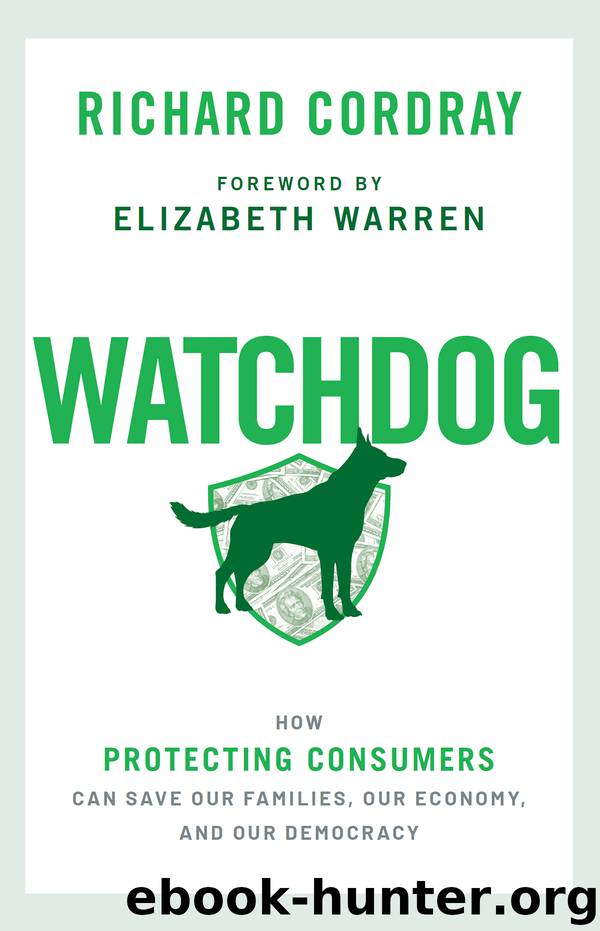Watchdog by Richard Cordray

Author:Richard Cordray
Language: eng
Format: epub
Publisher: Oxford University Press
Published: 2020-03-15T00:00:00+00:00
Financial Empowerment
Our Office of Financial Empowerment centered on consumers with low or moderate incomes. The vise of income inequality has many Americans firmly in its grip, and even those with modest means are ripe targets for predatory products.11 We looked for ways to reduce the shockingly high costs and risks of living in poverty. Unlike telephone companies and certain utilities, the law does not impose any principle of “universal service” on the financial companies that would require them to offer all consumers access to their services, including low-income consumers. They are thus free to cream off the more lucrative customers and ignore those stuck at the bottom of the barrel.12 As a result, poorer Americans who lack basic banking services often pay more just to access their own money, as well as to secure it and transact with it. When each financial transaction is a “one-off” event, prices hover at their highest levels, and customers do not enjoy the comfort and the many benefits they would gain from an ongoing relationship with a financial services company.
We tried to be opportunistic in finding ways to empower consumers. At a field hearing in Louisville, Kentucky, we launched a partnership with some cities and banks, as well as the Federal Deposit Insurance Corporation (FDIC), to help expand people’s access to safe bank accounts. America has about fourteen million adults who are “unbanked,” which sets them back enormously. They pay hefty fees every time they cash a check; they often deal in cash, which is risky and insecure; they find it hard to qualify for credit; and they have more trouble documenting their financial records. Banks use a screening process to block certain people out of the banking system, sometimes based on fraud risk but often because of prior bad experiences, including bounced checks and unpaid overdraft charges that may have led to account closures. We urged banks to offer safe accounts without overdraft fees, so they would not have to screen out potential customers based on that risk. These accounts are suited not only to those with low incomes but also to those, like many millennials, who mistrust banks for imposing hefty fees. Several of the largest banks have begun to offer this type of account. In the past few years the number of people who are unbanked has begun to decline, though it remains unacceptably high.13
We also issued a report that identified and described “credit invisibles”—people who are unable to qualify for credit because they have no or little credit history. This is a huge hindrance to personal opportunity. This group overlaps with the unbanked but is even larger—about twenty-six million Americans. We convened a field hearing in Charleston, West Virginia, to learn more about the problem. One point we noted is that every one of us starts out in life as a “credit invisible,” and then, as we move into adulthood, we may generate enough of a financial record to qualify for access to credit. That can happen in good ways,
Download
This site does not store any files on its server. We only index and link to content provided by other sites. Please contact the content providers to delete copyright contents if any and email us, we'll remove relevant links or contents immediately.
The Secret History by Donna Tartt(19088)
The Social Justice Warrior Handbook by Lisa De Pasquale(12190)
Thirteen Reasons Why by Jay Asher(8910)
This Is How You Lose Her by Junot Diaz(6887)
Weapons of Math Destruction by Cathy O'Neil(6280)
Zero to One by Peter Thiel(5802)
Beartown by Fredrik Backman(5754)
The Myth of the Strong Leader by Archie Brown(5507)
The Fire Next Time by James Baldwin(5446)
How Democracies Die by Steven Levitsky & Daniel Ziblatt(5218)
Promise Me, Dad by Joe Biden(5153)
Stone's Rules by Roger Stone(5088)
A Higher Loyalty: Truth, Lies, and Leadership by James Comey(4964)
100 Deadly Skills by Clint Emerson(4925)
Rise and Kill First by Ronen Bergman(4789)
Secrecy World by Jake Bernstein(4753)
The David Icke Guide to the Global Conspiracy (and how to end it) by David Icke(4720)
The Farm by Tom Rob Smith(4511)
The Doomsday Machine by Daniel Ellsberg(4490)
